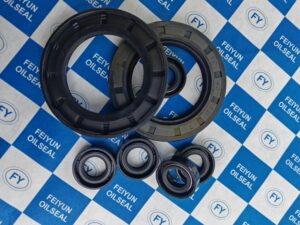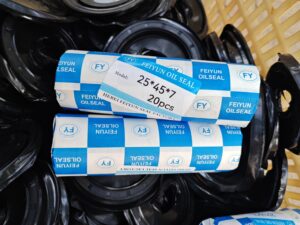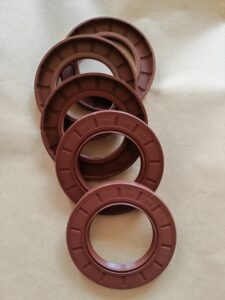Table of Contents
ToggleWhat is TC in Oil Seal?
In industrial and automotive sealing applications, TC is a widely recognized designation for a specific type of oil seal. Rooted in the Japanese Industrial Standard (JIS), this classification defines both the lip design and material construction of the seal. Below, we break down the meaning, features, and applications of TC oil seals to provide a comprehensive understanding.



Decoding “TC”: Design and Material
The abbreviation TC in oil seals represents two critical components of its design:
- T = Twin-Lip Configuration
- C = Rubber-Coated Metal Case
1. Twin-Lip Configuration
This design incorporates two distinct sealing lips with specialized functions:
- Primary Lip: The main sealing element retains lubricants (oil, grease) within the machinery.
- Secondary Lip: A supplementary barrier that prevents external contaminants (dust, dirt, moisture) from entering the system.
This dual-lip architecture ensures dual protection: retaining internal fluids while excluding environmental pollutants, making TC seals ideal for harsh operating conditions.
2. Rubber-Coated Metal Case
The seal’s structural foundation is a metal casing (typically steel) fully encased in rubber. This coating offers:
- Corrosion Resistance: Protects the metal from chemical or moisture-induced degradation.
- Improved Conformity: Enhances the seal’s ability to adhere to housing surfaces, minimizing leakage risks.
- Vibration Dampening: Reduces wear caused by mechanical vibrations.
Key Features of TC Oil Seals
TC oil seals are engineered for performance and durability. Their defining characteristics include:
1. Enhanced Sealing Efficiency
- The twin-lip design creates redundant sealing layers, significantly reducing the likelihood of fluid leakage or contaminant ingress.
- Applications with high-speed rotating shafts or variable pressures benefit from this robust sealing mechanism.
2. Material Versatility
TC seals are manufactured using materials tailored to operational demands:
- NBR (Nitrile Rubber): Cost-effective and resistant to oils, fuels, and moderate temperatures (typically -40°C to +120°C).
- FKM (Fluoroelastomer/Viton): Suitable for high-temperature and aggressive chemical environments (up to +200°C).
- Silicone: Used in extreme temperature ranges (-60°C to +200°C) and food-grade applications.
3. Standardized Dimensions
As a JIS-standardized product, TC seals follow precise dimensional codes (e.g., JIS TC 20x40x10). This ensures:
- Interchangeability: Compatibility with standardized housings and shafts.
- Ease of Sourcing: Simplified procurement due to uniform specifications.
4. Durability in Harsh Environments
- The rubber-coated metal case resists corrosion, UV exposure, and mechanical stress.
- Twin lips minimize abrasive wear, extending the seal’s service life even in dusty or wet conditions.
Applications of TC Oil Seals
TC seals are indispensable in industries requiring reliable sealing solutions. Common use cases include:
1. Automotive Systems
- Engines: Sealing crankshafts and camshafts to retain oil and block debris.
- Transmissions and Gearboxes: Preventing lubricant leakage in high-torque environments.
- Wheel Hubs: Protecting bearings from dirt and moisture.
2. Industrial Machinery
- Pumps and Compressors: Ensuring fluid retention in hydraulic or pneumatic systems.
- Electric Motors: Shielding internal components from contaminants.
3. Heavy-Duty Equipment
- Construction Machinery: Withstanding extreme dust, vibration, and temperature fluctuations.
- Agricultural Equipment: Sealing gearboxes and axles in tractors or harvesters.
Why Choose TC Oil Seals?
The TC designation guarantees a balance of performance, longevity, and standardization:
- Dual Protection: Twin lips address both retention and exclusion challenges.
- Adaptability: Material options cater to diverse operational requirements.
- Global Compliance: JIS standards facilitate global compatibility and quality assurance.
Summary
TC in oil seals signifies a JIS-standardized sealing solution characterized by a twin-lip design and rubber-coated metal casing. It excels in applications demanding robust contamination control and fluid retention, such as automotive drivetrains, industrial pumps, and heavy machinery. By combining material versatility with standardized engineering, TC seals remain a cornerstone of reliable sealing technology worldwide.



Leave A Comment